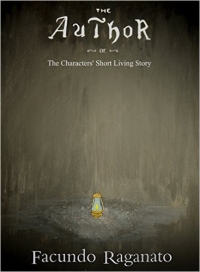Title: The Author – or – The Characters’ Short Living Story
Author: Facundo Raganato
Publisher: Harvard Square Editions
ISBN: BOORRLUAKA
Pages: 255
Genre: Literary Fiction
Reviewed by: Carol Davala
Buy on Amazon
www.thecharactersshortlivingstory.com
Pacific Book Review
Renowned Belgian artist René Magritte, like many of the Surrealists of the 20th century, created works of art that focused on images of reality and illusion. This unique style often united the conscious and unconscious spheres of experience in an effort to bring dreams and fantasy into the everyday. Against a cloud-filled backdrop, the view of a dapper man in a bowler hat, with his face concealed by a floating apple, in essence alluded to the artist’s own self-portrait. Though such images are simple enough, they maintain an underlying complexity as they challenge the observer’s preconceived notions of reality.Here in “The Author – or – The Characters’ Short Living Story”, Facundo Raganato presents the same paradox. This rare fictional treatise is designed around a captivating premise that goes beyond the framework of a traditional storyline to incorporate an unusual directive where the author, the characters, and the reader all cross standard literary thresholds to interact on an intricate philosophical plane. Ultimately the soul of the story is rooted in the connection between the writer, his creation, and the audience.
Raganato sets the stage with six disparate characters, each distinguished in their detailed personalities. Appearing in a dark space, they are unaware of where they are, or how they arrived. An oil lamp is the only means of illumination at the center of the room. With little recollection of the past, displaced into the present, and facing an unknown future, the group venture forth into an unpredictable landscape, cloaked in the allegory of good and evil, shadow and light. Soon each will embark on their own journey of self-discovery, in a core search for truth. In the literal realm of this tale, a little black book may hold the answers to the esoteric questions voiced by these venturous seekers. But the most purposeful guidance comes in the form of the author who inflicts his own personage and psyche into the heart of this narrative. Through a seemingly ‘tip of the hat’ homage to Magritte’s painting, the author appears as a man in a derby. With his face often in shadow, he maintains an uncanny presence throughout, eliciting questions of knowledge, thought, belief, and perception, via conversations and action with both the characters and the reader.
This is a world of locked and unlocked doors. There are dark tunnels and unending staircases that call to mind the famous black and white drawings of M.C. Escher, an artist known for his impossible graphic constructions. In this nebulous setting, mirrors provide both a literal and figurative component for the characters’ self-reflection, while a ride on “The Retrospect Express” offers a glimpse at each of their pasts. In this ever-changing playing field, nature exudes her force in the form of inclement storms, quicksand, fire, and tremulous quakes. Characters move about in crimson carpeted rooms with purple walls, view premonitory headstones in spirited graveyards, and make ominous crossings over the dark waters of the underworld. With characters gathered as observers in an archaic theatre, the author as a magical showman unveils six particular objects that symbolically correlate to these motley travellers.
“The Author” is an exceptional work crafted by a well-honed literary mind. In its two-fold purpose, Raganato has written a fluid character piece where strangers bonded by curiosity will question their existence, test their fears, and challenge obstacles, all in an effort to escape their unfamiliar surroundings. From a more mindful, philosophical perspective, the book offers a magnetic draw for those searching for hidden truths and wisdom. Clearly the work is heightened by its clever, creative format, and the overall unfolding quandary. While an author’s purpose is often implicit in any given story, Raganato directs us to look beyond the words, advising that therein lies the true meaning of literature. Here on a most unusual narrative path, readers will discover a rare, enlightening treasure.


